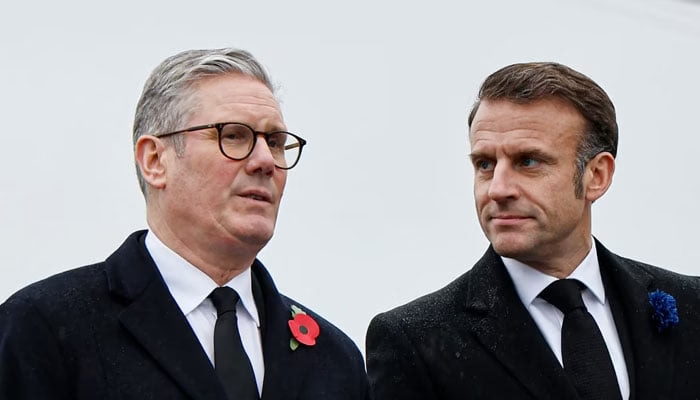In a significant phone call between British Prime Minister Sir Keir Starmer and French President Emmanuel Macron, the two leaders discussed the ongoing issue of increasing US tariffs and their potential impact on global trade. The discussion, which took place amid escalating trade tensions between the United States and other nations, highlighted growing concerns over the repercussions of such tariffs, particularly for Southeast Asia and the broader global economy.
A Unified Stance on Trade War Concerns
Both leaders emphasized that a trade war is detrimental to all parties involved. Prime Minister Starmer and President Macron agreed that the ongoing trade conflict sparked by the Trump administration’s tariffs was not in the best interest of any nation. As major European powers, both the United Kingdom and France recognize the importance of maintaining a stable global trading system, one that is rooted in cooperation rather than escalating tariffs and retaliatory measures.
The two leaders also underscored the importance of dialogue and diplomacy in resolving trade disputes. Their conversation reflected a mutual desire to prevent the trade war from spiraling further and affecting not only bilateral relationships but also the global economy.
The Impact of US Tariffs on the Global Economy
One of the key concerns raised during the call was the far-reaching effects of US tariffs on global markets. The tariffs, which have been imposed on a range of goods, including Chinese imports, are already creating ripple effects that extend beyond the US and China. Both Starmer and Macron expressed their reservations about the long-term consequences of these tariffs on the world economy.
For many economies, particularly those that rely heavily on international trade, the tariffs pose a serious threat to stability. Southeast Asia, in particular, is expected to be significantly impacted by the increased US tariffs, with countries in the region being caught in the crossfire of the trade dispute between the US and China. These countries, which have long been integral players in the global supply chain, are already seeing signs of strain as their trade relations with both the US and China face growing uncertainty.
Southeast Asia: The Unseen Casualty of the Trade War
Southeast Asia has long been a crucial hub for global manufacturing and trade, with nations such as Vietnam, Thailand, and Indonesia playing key roles in the supply chains of products ranging from electronics to textiles. However, as the US-China trade war intensifies, these countries are beginning to feel the pressure.
As tariffs increase, many businesses that have relied on China for low-cost manufacturing are seeking alternatives in Southeast Asia. While this could initially seem like an opportunity for these nations, the reality is more complex. Increased competition for investment and resources could lead to economic instability in the region, as countries struggle to meet the demands of foreign companies while maintaining their own economic growth.
Additionally, many Southeast Asian countries have strong trade relationships with both the US and China. As a result, they are vulnerable to the effects of tariffs imposed by both sides. These tariffs could lead to higher costs for goods, reduced access to markets, and a slowdown in economic growth. In particular, the electronics sector, a major industry for countries like Vietnam and Malaysia, could suffer as global supply chains are disrupted.
A Call for Multilateral Solutions
Both leaders agreed that the solution to this trade dispute lies in multilateral diplomacy and negotiation. They expressed their commitment to working together within international frameworks like the World Trade Organization (WTO) to address the concerns raised by the US tariffs. Prime Minister Starmer and President Macron both reiterated their belief that the global economy functions best when countries engage in fair and cooperative trade practices.
By encouraging dialogue and cooperation, the two leaders hope to mitigate the damage caused by the trade war and ensure that global trade remains open and accessible to all nations. While both leaders expressed concern over the current state of affairs, their call for multilateral action signals hope that a resolution can be found that benefits all parties involved.
The Broader Implications of Rising US Tariffs
The conversation between Sir Keir Starmer and Emmanuel Macron serves as a reminder of the broader geopolitical and economic consequences of the US tariff policy. As the world watches the ongoing trade war, the effects are already being felt across industries, markets, and nations far beyond the US and China.
The increase in tariffs threatens to create a fragmented global economy, one that is characterized by protectionist policies and a decline in international cooperation. For countries like the UK and France, which have long championed open trade and diplomacy, the growing tensions are a cause for concern. As they continue to navigate the complexities of the trade war, it is clear that the stakes are high—not just for the US and China, but for the entire global economy.
A Future of Uncertainty
As the trade war unfolds, the future of global trade remains uncertain. The conversation between Keir Starmer and Emmanuel Macron highlights the urgent need for multilateral solutions and a return to diplomatic dialogue. While the immediate effects of the US tariffs are clear, the long-term impact on global markets, particularly Southeast Asia, remains to be seen.
For now, the world waits to see whether diplomatic efforts can temper the effects of the trade war and restore stability to global trade. The stakes are high, and the consequences of inaction could be far-reaching, affecting not just the US and China but economies worldwide.



